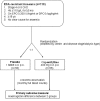Oxpentifylline versus placebo in the treatment of erythropoietin-resistant anaemia: a randomized controlled trial
- PMID: 18671885
- PMCID: PMC2519060
- DOI: 10.1186/1471-2369-9-8
Oxpentifylline versus placebo in the treatment of erythropoietin-resistant anaemia: a randomized controlled trial
Abstract
Background: The main hypothesis of this study is that Oxpentifylline administration will effectively treat erythropoietin- or darbepoietin-resistant anaemia in chronic kidney disease patients.
Methods/design: Inclusion criteria are adult patients with stage 4 or 5 chronic kidney disease (including dialysis patients) with significant anaemia (haemoglobin <or= 110 g/L) for at least 3 months for which there is no clear identifiable cause and that is unresponsive to large doses of either erythropoietin (>or= 200 IU/kg/week) or darbepoetin (>or= 1 microg/kg/week). Patients will be randomized 1:1 to receive either placebo (1 tablet daily) or oxpentifylline (400 mg daily) per os for a period of 4 months. During this 4 month study period, haemoglobin measurements will be performed monthly. The primary outcome measure will be the difference in haemoglobin level between the 2 groups at the end of the 4 month study period, adjusted for baseline values. Secondary outcome measures will include erythropoiesis stimulating agent dosage, Key's index (erythropoiesis stimulating agent dosage divided by haemoglobin concentration), and blood transfusion requirement.
Discussion: This investigator-initiated multicentre study has been designed to provide evidence to help nephrologists and their chronic kidney disease patients determine whether oxpentifylline represents a safe and effective strategy for treating erythropoiesis stimulating agent resistance in chronic kidney disease.
References
-
- Benz RL, Pressman MR, Hovick ET, Peterson DD. A preliminary study of the effects of correction of anemia with recombinant human erythropoietin therapy on sleep, sleep disorders, and daytime sleepiness in hemodialysis patients (The SLEEPO study) Am J Kidney Dis. 1999;34:1089–1095. doi: 10.1016/S0272-6386(99)70015-6. - DOI - PubMed
-
- Macdougall IC, Cooper AC. Erythropoietin resistance: the role of inflammation and pro-inflammatory cytokines. Nephrol Dial Transplant. 2002;17 Suppl 11:39–43. - PubMed
-
- Cooper AC, Mikhail A, Lethbridge MW, Kemeny DM, Macdougall IC. Increased expression of erythropoiesis inhibiting cytokines (IFN-gamma, TNF-alpha, IL-10, and IL-13) by T cells in patients exhibiting a poor response to erythropoietin therapy. J Am Soc Nephrol. 2003;14:1776–1784. doi: 10.1097/01.ASN.0000071514.36428.61. - DOI - PubMed
Publication types
MeSH terms
Substances
LinkOut - more resources
Full Text Sources
Medical


